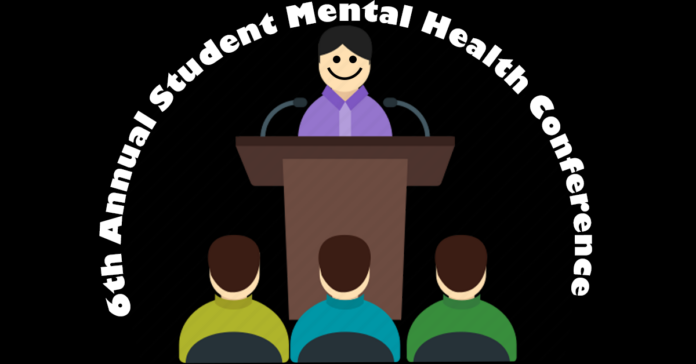
The Wellness Center at Rowan University held its sixth annual Student Mental Health Conference. Students who are seeking mental health resources or aid were able to attend this talk to learn more about coping mechanisms, strategies for stress, and equity in Rowan spaces.
The conference was held on Nov. 14 from 10:30 a.m. to 2 p.m. and was located at the Eynon Ballroom in the Chamberlain Student Center.
The event opened up with Wellness Center Graduate Coordinator Jeannie Corcione, who introduced who would be speaking at this event and welcomed students and faculty who joined the conference. For attendees, they were provided with coffee and after the opening ended, students could walk around the ballroom lobby to speak with Wellness Center interns.
Wellness Center interns are put through training programs as graduate students and are supervised by veteran staff at the Wellness Center. They are currently learning how to help the students and provide support, so at the event, one of their tasks was to introduce first-year students, transfer students, or anyone else to what they can do to get support from the university. Estrella Delgado an intern at the Wellness Center who was tabling in the lobby, expressed her hopes of what students can take away from visiting the Wellness Center.
“We definitely try to connect them with other students because that way, they kind of have a good community. If they need a lot more support, we can offer services in terms of pet therapy, or one of our counselors and our Let’s Talk Program,” Delgado said. “We want to show that extra step to understand where they’re coming from and connect them to a resource on campus.”
At 11:00 a.m., Za’keria Sykes, the first speaker of the event, talked about coping mechanisms and how to think positively. Sykes is the President of the Black Student Union (BSU) and she is also a psychology major who wants to focus on helping BIPOC students in finding ways of combating maladaptive tendencies.
She explained in her presentation the difference between adaptive and maladaptive responses to stressful situations. Adaptive responses are healthy behaviors in stressful situations, she talked about how to think of a positive reinforcement that decreases stress. An example she gave is a common one that all students may experience: balancing work and school.
“A most common stressor is students working and also being a college student. Identifying the stressor is the first step, step two is to find a positive reinforcer,” said Sykes. “And that can be like finding a work-study where you can get your homework done and work at the same time, or even an off-campus job that has flexible scheduling.”
She states that she experiences these high levels of stress because of being a full-time student and a full-time worker. Sykes mentions that the purpose of this presentation was to inform students on ways of dealing with stress healthily. A lot of time, she believes, students tend to respond to maladaptive behaviors like poor self-care, drinking alcohol, and smoking.
The Wellness Center can provide aid in educating students on how to foster healthier lifestyles, which could decrease high levels of stress. This is known as the Student Health Services (SHS) which are run by trained medical professionals at the Wellness Center who provide care and collaborate with the Counseling and Psychological Services to care for students’ well-being.
After two speakers shared their stories on their battle with their mental health, the event broke out for lunch.
The conference featured talks from four other speakers, including Zuneidy Ortega Sanchez, Jocelyn Reuben, Zachary Brown, and Dr. JoAnna Murphy.
Brown presented his information at 12:45 p.m. on “The Intersection of Mental Health & Disabilities.” In this presentation, Brown talked about his personal experience with type 1 diabetes and his frustration with having to hide his condition due to the fear of rejection.
“I remember coming into college, I was going to Holy Family University, originally, and I was very nervous to tell my friends that I had type 1 diabetes only because I felt that I would get that judgment,” Brown said. “I would take my insulin injections in the bathroom because I was too embarrassed to do that in front of other people.”
He hoped to focus on ending the stigma of shame that those with disabilities face. He urged faculty to learn how to interact with students with disabilities so they can be better partners for them. He also urged his peers to be more supportive and educate each other on the different definitions of disability. Which he expressed are apparent disabilities, ones that can be seen, and nonapparent disabilities, ones that cannot be detected as easily.
The event ended with closing remarks and how students can learn about more resources on campus involving mental health.
For comments/questions about this story DM us on Instagram @thewhitatrowan or email thewhit.newseditor@gmail.com





